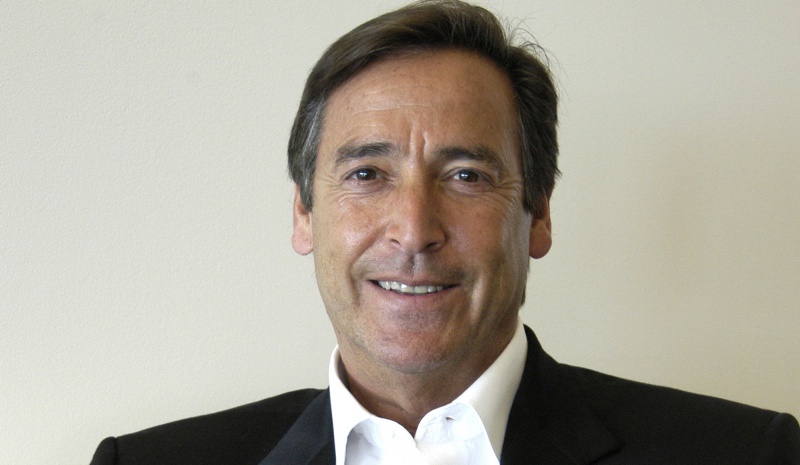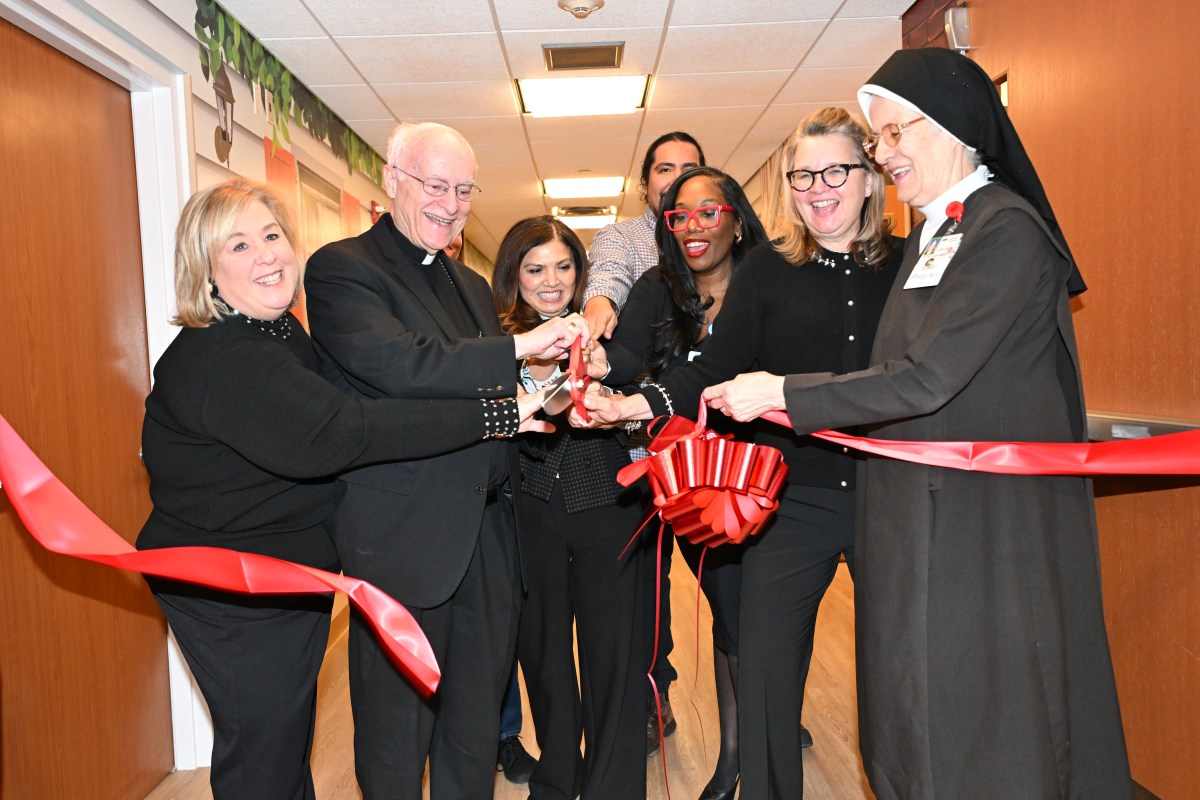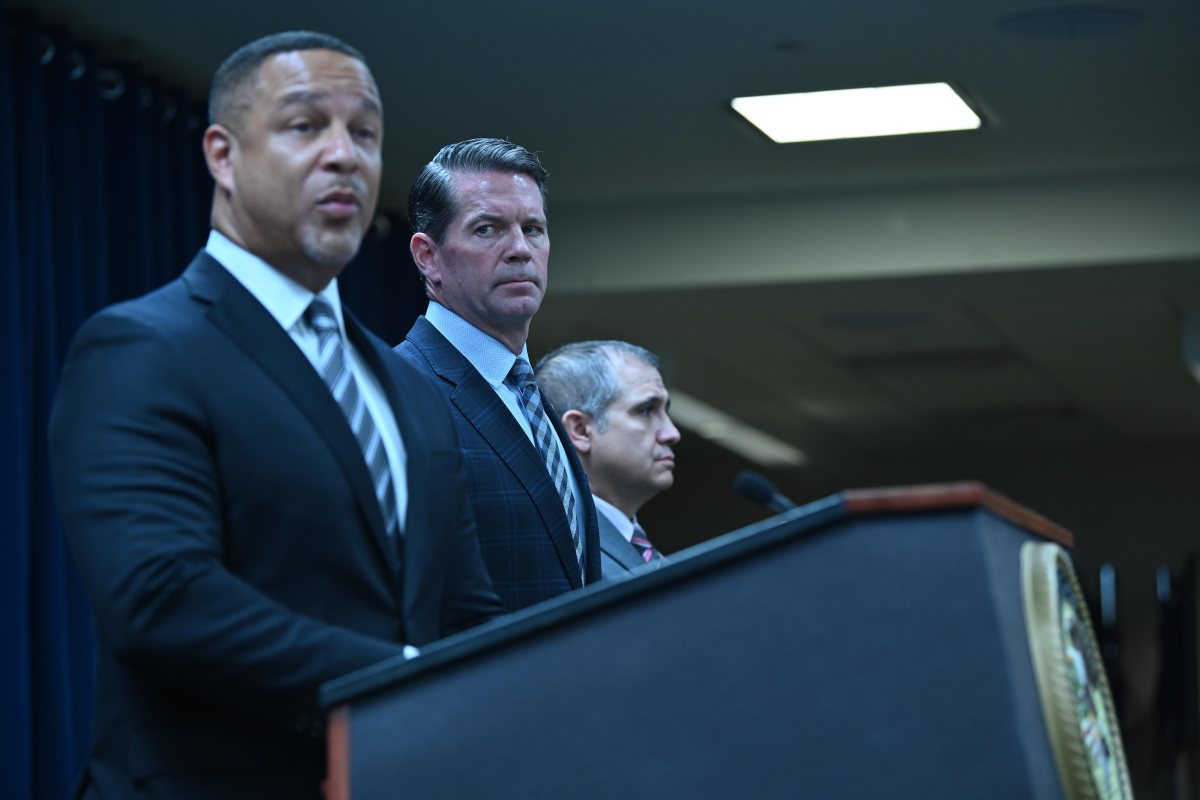Who's Here? Bill Koenigsberg, Media Mogul

Bill Koenigsberg heads up Horizon Media, now the largest independent advertising media agency in the world. He founded this company in 1989, continues to own 100% of it, has a nice spread near the beach in Sagaponack where he lives with his wife and kids when not in Manhattan, and is a classic American success story, starting from middle class circumstances, taking risks, getting a bit of luck and on talent and drive, making his way to the top.
I met up with him the other morning, in the remarkable set of offices in which he works, 200,000 square feet of it, which take up three entire interconnected floors of a former factory building in the Tribeca section of lower Manhattan. He showed me through the place, a vast series of open areas largely made of maple, glass and steel that, from almost everywhere, his employees enjoy, among many other things, stunning views of the Hudson River and lower Manhattan. There are meeting rooms, workout rooms, glass half-cubicles, a game room, a theatre, a “wonder wall” of computer generated data by the reception area, a gym, a yoga studio, a restaurant and, all over the place, tucked away, work spaces that interspace amongst small gardens.
“People who work here,” I said, “don’t want to go home.”
“We have the lowest turnover rate in the industry,” he told me. “It is indeed a great place to work.”
We stopped in front of a stretch of people working on a long desk of 30 or so computers. A media data center.
“We track the world here,” he said. There were a series of bar graphs on a large screen on one wall, and Bill asked the strategist working there to explain one of them. Turned out that one was tracking how many mentions were being made nationwide on social media for Corona Beer. By the hour, for the past week.
“I could show you the week before,” the strategist volunteered.
“People pay attention to what people share around online,” Bill said.
Perhaps that helps explain exactly what Horizon Media does. When a client hires an ad agency, they are looking for creative work. Over the last 15 years as media has become extremely complex and diversified media communication agencies have become the focal point of the client marketing communication architecture and that is what Horizon does.
Horizon is the largest Independent Media Agency in the world handing the media function for blue chip clients such as Geico, Capital One, United Airlines, A&E Networks, Weight Watchers, Corona Beer and dozens of other clients managing media investments totaling over $4 billion.
The firm has four offices around the country, employs over 800 employees in the U.S. and has a network of offices in 40 countries around the world.
Bill Koenigsberg was born on Christmas Eve in 1955 and grew up in Long Beach, Long Island. His father owned a home-heating oil business with his grandfather and they delivered as far as Manhattan. His mom was a mom. He has two older brothers and one younger sister.
“I was an athlete growing up,” he said. “I played baseball and tennis. Long Beach at that time was a diverse community. We had people from all walks of life. It was a beach community and a great place to grow up.”
Bill went to Long Beach High School and was on the tennis team. He went to the New York State Championships where, with a partner, won the doubles final, but lost the singles final.
“My family was thinking I might become a tennis star. I thought that was possible too. But then I had another love in my life. I was a television junkie. I loved the programs, particularly when I was in grammar school. And I also loved the commercials. When I was old enough to think about these things, I thought I’d like to go into advertising.”
Bill described his first foray into advertising.
“It was a summer job. I was sixteen. I got hired to manage the tennis courts in Atlantic Beach, Long Island. There was a man who had the leasing rights, and he had a son who was handling the reservations. There were three courts. But the kid couldn’t keep it straight. He’d rent out the three courts to six groups at the same time. So I got drawn into this to straighten it out and get it organized for them. But more interesting was this: There was a luncheonette nearby. I traded for lunches. They’d give me lunch. I’d put up a sign advertising their luncheonette on the tennis court.”
Graduating high school, Bill went off to the University of Miami in Florida. He still didn’t know whether he should follow one or the other career, so he went there for the marketing program, which was widely admired, and he went there to join the tennis team, which had recently been a contender for national honors. Also, while at Miami, he was selected to join the advertising team entering into a competition to create a nationwide campaign for the New York Heart Association. His team won.
“I still remember our campaign slogan,” he said. “It was ‘Learn to Live.’”
Also at Miami, he made a mistake that determined his course in life.
“I was late for class so I was in a rush. Our dorm had flights of stairs with landings at every floor. I leaned over the railing and thought, well, I’ll do this quick and just jump down to the next landing.”
That leap resulted in a trip not to class but to the hospital. The injuries included two broken bones in his ankle. He’d never play professional tennis.
Graduating with a degree in Marketing from Miami, Bill first went into downtown Miami looking for a job at one of the ad agencies there. He soon realized that Miami was not the center of the world as far as advertising was concerned. He didn’t find a job.
“Eventually, I realized I’d have to move to New York City. I really liked Miami and didn’t want to leave. But New York was where the action was. I spoke to my parents. They said they could support me emotionally, but not financially. I was welcome to use our home as a base. And so I did.”
Bill tried to get a job at the major ad agencies at the time—J. Walter Thompson, BBDO, Doyle Dane. But the creative departments wanted a portfolio, and the account management departments wanted an MBA. So he changed his tack. They also had media departments. He’d try those.
“I went to them all. I’d drop off resumes on Monday, do call backs on Tuesday, drop off resumes on Wednesdays, do call backs Thursdays. Once in a blue moon, I’d get an interview. Sometimes it would turn out there was no job. But they’d offer advice. I so much appreciated that. It’s a reason why today, I am always open to anyone who wants advice. I know how that helps.”
Then Bill got a break. His younger sister was dating a man who had a brother working at a media-buying agency. At that time, this was in 1978, this was a very unusual thing. Large ad agencies always had media departments. But now small boutique ad agencies were springing up, and there were a few small firms, separate from the boutique agencies, who specialized in media buying that they would employ, thus giving the boutique agencies a better ability to compete. Their media buying would be as good or better than with the big agencies.
“My first agency job then was through my sister’s boyfriend’s brother. The firm was called ELA. It’s not in business anymore. It was at 23rd Street and Fifth Avenue. I went in there with my resumé. The guy looked at it briefly and asked me a few questions, then said ‘when can you start,’ and I said ‘anytime,’ and he brought me over to a desk. ‘How about now.’ And so, that was that.”
Bill thought he might stay there for six months, and, with his foot in the door, find a better job elsewhere. But that’s not what happened. Bill, it turned out, was very good at what he did. He stayed there six years, at the end of which time he was managing 90 people.
“People would ask me how old I was. I looked very young. And I would say ‘approaching 30,’ which was true. But I was 26.”
And then something happened which, Bill says looking back on it, was a bad thing at the time, but was also the best thing that happened to him.
“I was doing so well. The President of the company promised me my own car. It was the biggest perk in the company. I went out and shopped for it. I found one. It would be $150 a month on a lease. I told everyone I was getting a car, my family, my friends. And then there was a delay and eventually, I went to the President and asked him about it and he said he couldn’t get the board to approve it. I said but you told me, and I was really upset. I was happy there. I’d been there six years. I was planning to make my future there. And now, THIS?”
The next day, as it happened, Bill got a call from a headhunter. A firm named Media General based in the South wanted to set up a New York office. They wanted Bill to do it. Bill said yes.
And so that year, in 1984, Bill embarked on a full-blown career of putting his talent on display in the media business. He set the business up, and a few years after that, things beyond his control happened that came to him as an opportunity.
“Media General Media Services Group,” he told me, “was an ancillary business in a much larger firm that owned television stations, cable networks, magazines and other businesses. In 1989, this larger firm, doing just so-so, became the target of a hostile takeover. They were able to beat this takeover back, but in doing so, they saw what the takeover firm had intended to do. If the takeover had succeeded, all the ancillary businesses which were not part of the core business would be sold. One of those that would have been sold would have been Media General Media Services Group. Maybe these businesses should be sold.”
The parent company then decided to put all their ancillary businesses up for sale. As for Media General Media Services Group, they selected Bill Koenigsberg to try to find a buyer for it.
“I’d been watching Media businesses starting up and thriving. I’d even seen some of the big firms, such as Y&R, which had fought to keep their customers from going with the media businesses, now spinning off their media departments as independent businesses themselves. This was the seal of approval for our business. I didn’t want to sell Media General Media Services Group. I wanted to BUY Media General Media Services Group.”
Trouble was, he didn’t have the $13 million. So the first thing he did was to go to his bosses and convince them they should sell the business to him, but then lend him the $13 million as a loan so he could do that. He would pay it back out of profits. And they went along with it.
Thus was born Bill Koenigsberg’s new company, which he renamed Horizon Media. And then, just six months into the purchase, the country went into the big Recession of 1990.
“If I knew then what I know now,” Bill said, “I would have handed back the keys. I had no idea how bad it was going to get. I maxed out my credit cards. I reduced my salary to zero, began paying bills when the cash came in. It was horrendous. This lasted for three years.”
Around him, other media companies were collapsing or being bought up by larger companies. Bill decided he would not sell. Having competitors merging meant he had better chances to grow. He pressed on, the recession passed and here he was, perfectly positioned to ride the wave. And so he did. In 2009, the leases on his offices came up in midtown Manhattan and he had to make a decision. He could renew the leases, or he could take a huge gamble, rent this enormous 200,000 square foot space in Tribeca, and build out and continue to capitalize on what he built. He chose to build out. And here we sat today.
In 2012, Bill was recognized by Adweek in their profile of “The Givers,” a list of the top 10 philanthropists from the worlds of media, marketing and entertainment. Bill was named Ad Age Executive of the Year in 2011 and is the only person to receive the prestigious Advertising Age Media Maven Award twice, in 2001 and 2010. In 2006, Bill was honored as Media Executive of the Year by Mediaweek Magazine and was featured as one of the industry’s top 50 most influential executives in the business in the annual Mediaweek 50 report in 2008, 2009 and 2010. Bill was also awarded the IRTS Foundation “Hall of Mentorship Award” for his knowledge to help others learn and grow. In 2011, Bill was awarded City Harvest’s “the Star of the City Award” for his longstanding commitment to and support of the organization.
Recently he got a call from Ave Butenski. This was the man who had been his boss at ELA in the late Seventies when he had been offered a company car and then had the offer withdrawn. He hadn’t heard from him in 30 years.
“I hear you’re doing really well,” Butenski said. “I have a friend with me from the movie business I’d like to introduce to you. He might be interested in your services.”
Butenski came up.
“Boy. I knew you were successful. I didn’t know you were THIS successful.”
“I owe it all to you,” Bill said.
“I know you saw me as a mentor,” Ave said. “But I didn’t teach you all this,”
“It’s not that,” Bill continued, “it’s that if you’d never reneged on the car, well, all this never would have happened. I never would have left the company so thank you. I really mean it.”
Bill Koenigsberg lives in Manhattan with his wife, young daughter and two older sons from a prior marriage. At the present time, the family is remodeling an apartment in Tribeca and expects to move in there in the fall.
And then there is Sagaponack.
“I’ve always loved the beach,” he said. “I was raised on fresh air. I’ve known the East End for years, since at least 1980 when I used to come out to Montauk.
“My wife says Sagaponack reminds her of the Netherlands. She loves it here. We built a house just off of Daniel’s Lane, and when we come out here, I just love it, the smell, the relaxed atmosphere, the horses—both my wife and daughter ride. I watch. We like biking, jogging, and taking long walks. It gives me the time and space to think.
“I’m very involved in charities, the environment and its preservation. I am a big supporter of the American Cancer Society, which hosts their annual Festive in Flip Flops summer event in the Hamptons.”
Bill Koenigsberg supports many charities and sits on a number of boards, both charitable and otherwise. They include City Harvest, the International Radio and TV Society, Partnership at Drugfree.org, God’s Love We Deliver, Rett Syndrome Research Trust, and out east the Group for the East End just to name a few.
I looked around his wonderful glass offices that overlook the water all around.
“Sometime when I want to write a story,” I asked, “would it be all right if I might come down here and sit in one of your little work spaces?”



